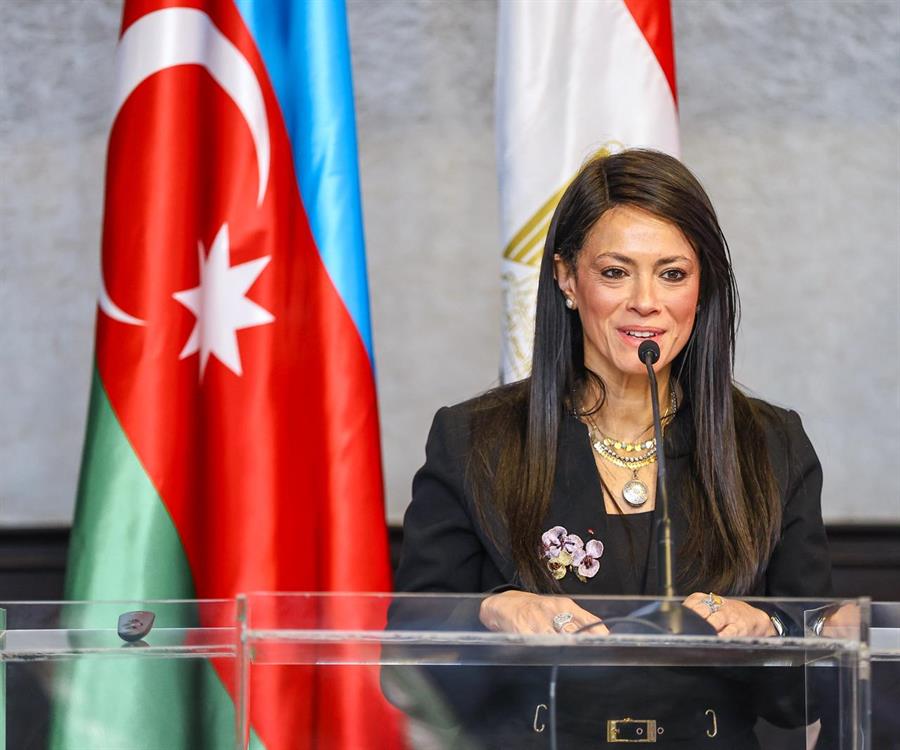Minister of Planning, Economic Development, and International Cooperation Participates in a Panel Discussion on Investing in Human Capital in a Tech and AI - Driven World
17 November 2025
During the 2nd Day of "Cairo ICT" Conference and Exhibition
Minister of Planning, Economic Development, and International Cooperation Participates in a Panel Discussion on Investing in Human Capital in a Tech and AI - Driven World
Dr. Rania Al-Mashat:
Artificial Intelligence intersects with various sectors and contributes significantly to bridging development gaps.
The State places great importance on the technology sector to enhance its role in increasing productivity and exports.
Qualifying the human element to deal with modern technology is a key part of the State's vision.
Artificial Intelligence is not just a technology; it is a fundamental driver for development in the current century.
H.E. Dr. Rania Al-Mashat, Minister of Planning, Economic Development,
and International Cooperation, participated in the second day of the Cairo ICT
2025 Conference and Exhibition, during a panel discussion with the theme
“Investing in Human Capital in a World Driven by Technology and Artificial
Intelligence.”
In her keynote speech for the session, Dr. Rania A.
Al-Mashat emphasized the importance of the Cairo ICT 2025 Conference and
Exhibition, given the rapid global developments led by technologies such as
Artificial Intelligence (AI), smart manufacturing, and big data. This
necessitates countries to reformulate their development priorities, foremost
among them being investment in human capital.
The Minister of Planning, Economic Development, and
International Cooperation pointed out that AI has become one of the most
prominent drivers of change in the global economy, yet the human element
remains the decisive factor in guiding this change towards achieving
comprehensive development, increasing productivity, and enhancing
competitiveness.
Dr. Al-Mashat noted that the relationship between AI and
human development is complementary and interconnected; AI has contributed to
expanding human capabilities and fostering their potential, while its success
remains dependent on human skills, creativity, and the ability to develop and
effectively apply these technologies.
In this context, the Minister reaffirmed that the Egyptian
State has made investment in people a main pillar of its National Strategy for
Digital Transformation and building a knowledge economy. She mentioned that the
percentage of public investments directed towards human development sectors has
increased from 17% in 2014/2015 to 28% in 2025/2026. This clearly reflects the
State's commitment to prioritizing its citizens.
Dr. Al-Mashat also stressed the government's increasing
interest in promoting AI applications across various sectors due to their
direct impact on the quality of life for citizens and the efficiency of public
services, asserting that AI is no longer a luxury but a pivotal tool for
improving services, maximizing resource utilization, and supporting
decision-making.
Minister Al-Mashat highlighted that Egypt has redefined its
economic growth model to align with economic, technological, and geopolitical
changes. The Ministry of Planning, Economic Development, and International
Cooperation prepared “Egypt’s Narrative for Economic Development” as a
comprehensive framework that achieves integration between the government's
program of action and Egypt Vision 2030.
Dr. Al-Mashat reiterated that the Narrative prioritizes
sectors with higher productivity and greater access to export markets,
primarily Information Technology, Manufacturing Industries, Tourism,
Agriculture, and Energy.
Dr. Al-Mashat indicated that Egypt has adopted a National AI
Strategy, which H.E. The President of the Republic, in his opening speech for
its second edition, emphasized the necessity of completing the transformation
towards a digital society that adopts the latest technologies.
The Minister referred to the Ministerial Group for
Entrepreneurship, explaining that it has identified 12 priority sectors to
support innovation and open new markets, including: Health Tech, Digital
Education, Renewable Energy, Smart Mobility, Tourism Tech, and other promising
sectors.
Dr. Al-Mashat noted that through extensive consultations
with over 250 entities, including entrepreneurs, investors, and experts, the
Group prepared the "Egypt Startup Charter," which includes more than
80 supporting measures to be announced soon. These measures include:
simplifying procedures, facilitating access to finance, supporting
international expansion, and enabling startups to participate in government
projects.
The Minister indicated that the global debate surrounding
the impact of AI on the labor market requires a more comprehensive approach,
stressing that the issue is not about technology replacing the human element,
but about creating new career paths based on the skills required to operate,
employ, and adapt AI technologies. She added that the coming phase will witness
the emergence of specialized jobs that enhance the capabilities of human cadres
and raise productivity levels, reflecting the integration between humans and
technology.
Dr. Al-Mashat reaffirmed that Egypt, with a population base
exceeding 110 million, is rich in big data, which offers wide opportunities to
maximize its utilization across various sectors. She explained that the
development projects currently being implemented in the fields of health, education,
training, and laboratory testing generate a huge volume of data that can be
classified and analyzed, enabling the State to effectively utilize this
information to improve the quality of public services and enhance performance
efficiency through AI solutions.
The Minister mentioned that the recent Global Congress on
Population, Health and Human Development (PHDC) included several specialized
sessions that discussed the role of AI in the health sector and improving
citizen services, affirming that these applications directly contribute to
supporting the trajectory of growth and development and creating new knowledge-
and technology-based employment opportunities.
Dr. Al-Mashat pointed out that AI is no longer just an
emerging technology but has become a fundamental engine for development in the
21st century, calling for enhanced partnership among the government, private
sector, and society to invest in this technology to achieve sustainable
development and ensure a better future for coming generations.
Dr. Rania A. Al-Mashat concluded her speech by reiterating
that people will remain the focus of development in a world where AI
applications are accelerating, and that investing in human capital is the
investment with the highest return and longest-lasting impact. She also noted
that Egypt possesses the capabilities that qualify it to be a leading regional
hub in technology and AI, with clear support from the political leadership.









